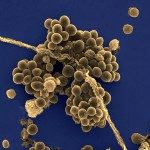Link to Pubmed [PMID] – 7726521
Antimicrob. Agents Chemother. 1995 Feb;39(2):500-6
We studied the ability of transposons Tn916, Tn1545, and Tn916-Km, a Tn916 derivative expressing kanamycin resistance, to be conjugatively transferred from Enterococcus faecalis to various gram-negative bacteria. Our results demonstrate that these types of elements can carry out conjugative transposition from the chromosome of E. faecalis to those of Escherichia coli and Pseudomonas fluorescens and that the accomplishment of this event depends on the donor potential of the E. faecalis transposon delivery strain. Since the tet(M) gene does not confer a selectable level of tetracycline resistance to gram-negative bacteria such as E. coli, the presence of another marker(s) readily expressed in these recipients is required for the detection of this type of transfer. Conjugal transfer of Tn916-Km from E. faecalis to E. coli is not restricted by the EcoK restriction system, nor does it depend on the presence of functional homologous recombination system and integration host factor proteins in the recipient bacteria.

